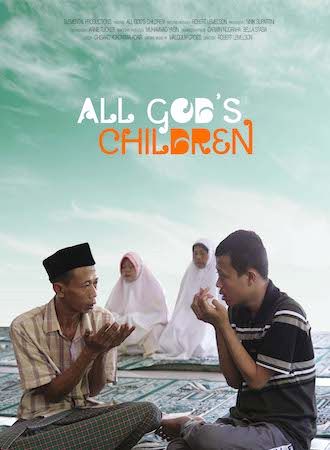
All God's Children 2021
Distributed by Documentary Educational Resources, 108 Water Street, 5A, Watertown, MA 02472; 617-926-0491
Produced by Robert Lemelson and Annie Tucker
Directed by Robert Lemelson
Streaming, 67 mins
General Adult
Adolescents; Autism Spectrum Disorders; Family
Date Entered: 06/08/2023
Reviewed by Irina Stanishevskaya, University of Alabama at Birmingham LibrariesAll God's Children is a case study documentary that portraits a story of Isti, a mother of twins, whose one son, Idris, has been diagnosed with autism spectrum disorder (ASD). ASD is a neurodevelopmental disability that leads to social, communication, and behavioral challenges for a child. “Everything with Idris was normal until he was two years old. After that he became as he is now. Because of his behaviors no one likes him. People run away when they see my son. They are afraid of him. As a mother, I’m sad to see people are afraid of my child” – says Isti with tears in her eyes in the beginning of the film. Her son is very strong physically, but he is unable to communicate verbally and control his behavior.
Living in Central Java, Indonesia, where cultural traditions are strictly observed, many people believe that having ASD child is the action of evil spirit and/or a punishment for past faults. “A healer told me that I was the cause of his [Idris] problem … everything was my fault” – recalls Isti. To cure the child, Isti and her husband, Mala, sold everything to afford services from professional doctors, traditional healers, psychic mediums, and religious specialists. However, those efforts did not bring any positive outcomes. Parental challenges, community pressure, and financial problems negatively contributed to Isti and Mala relationships and then led to divorce, when Idris was just five years old.
After the divorce, the twins were separated and Isti has continued to take care of Idris. She has never given up on her child and continued to seek recommendations from mental health providers. The filmmakers highlight the hardship of Isti’s motherhood. Raising a child with a lifelong disorder, lack of support from her ex-husband, and cultural-specific factors, made Isti to feel endless high stress, sadness, and emotional and social burden. During her interview with filmmakers, she explains: “People don’t understand how I feel because they have normal children.” In spite of many challenges, Isti tried to educate Idris and enrolled him to a special education public school, but the crowded school did not work well for him.
During Idris’ teenage years, Isti was able to board her son to a “Bina Anggita” school, which emphasizes personal approaches, positive care, and beneficial environment for educational and social needs of ASD children. The founder of the boarding school, Yasin, strongly believes that all children without any exceptions are God’s creation, and they need child-centered approach, care, and affection. Such approaches and constant efforts brought clear results in Idris case. The filmmakers visually document certain progress during his time at the school.
Throughout interviews with other parents of the school’s enrolled students, the audience can clearly see many common things: all parents experience anxiety, sadness, and disappointment. To support emotional well-being of families with ASD children, one parent from the school has organized “Forum Kompak,” an autism-specific support group. The group members share their parental fears, experiences, and knowledge during special meetings. In addition, they organize informative activities and social events where they try to integrate their children into community life.
The filmmakers bring the audience’s attention to two important events that Yasin and “Forum Kompak” have arranged for Isti’s family: the meeting with local community and family reunion. The meeting with Isti’s local community helped to educate its members about autism, Idris’ special condition, and the importance of his social acceptance and support. The family reunion and Idris’ socialization with his father and tween brother has positively affected emotional well-being of the entire family and strengthened their relationships.
A detailed chronicle of mother’s experience raising an ASD child, presented in the documentary, brings public awareness to unique needs of autistic individuals, parental challenges, and necessities of community-based social support and inclusion. The narration of the film is in Indonesian & Balinese with English subtitles. The film is appropriate for public and academic library collections.
Awards:Commendation – Werbner Award, Royal Anthropological Institute (RAI) Film Festival, USA, 2023; Best Ethnographic Film, New York International Film Awards, New York, 2021
Published and licensed under the Creative Commons Attribution 4.0 license. Anyone can use these reviews, so long as they comply with the terms of the license.